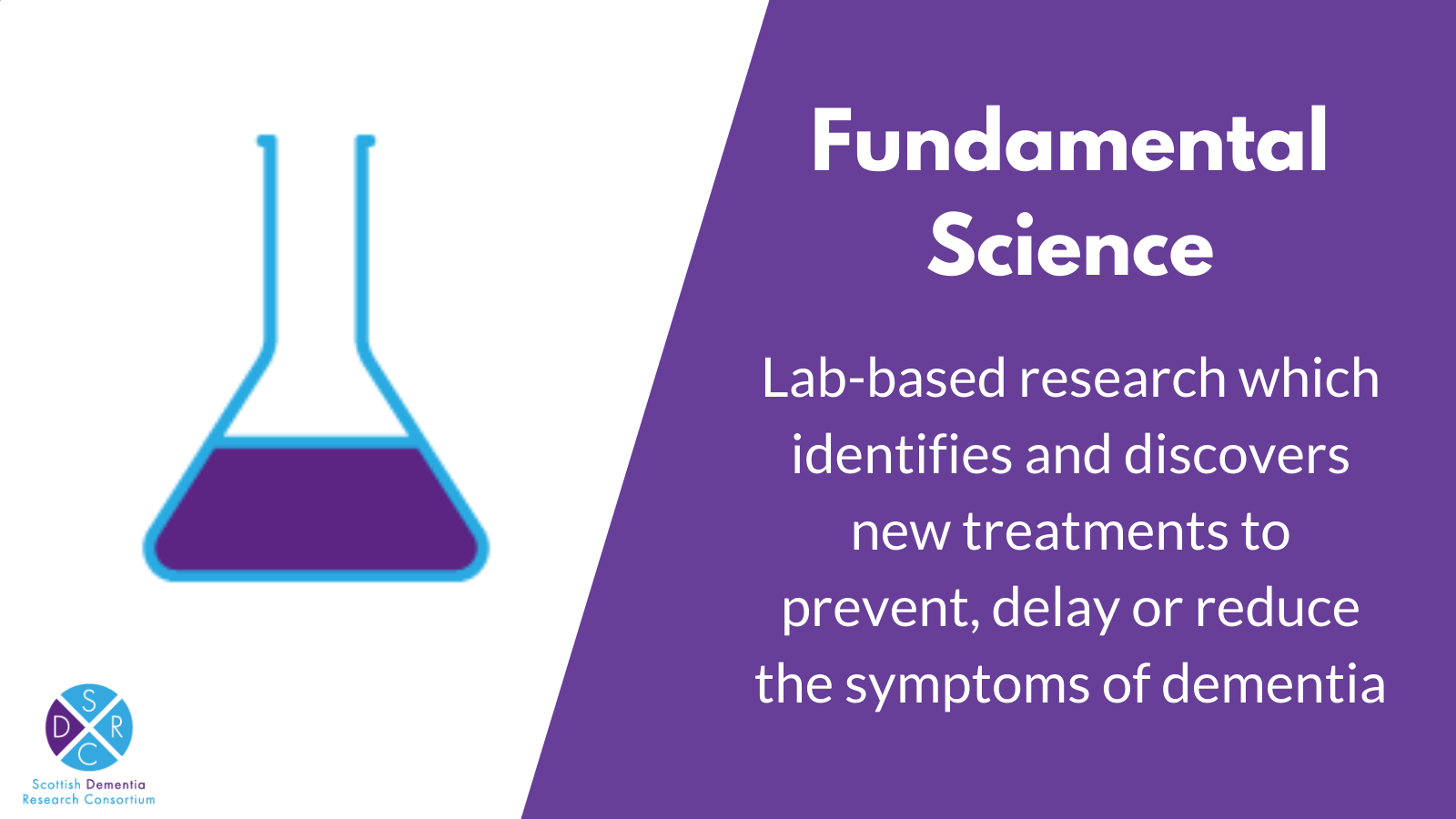In the SDRC Annual Report 2022/23 we dedicated a section each to the progress and ongoing work of the SDRC research themes. The following extract is focusing on the Fundamental Science theme, led by Professor Frank Gunn-Moore and Dr Sophie Bradley. Read more below.
Summary of the theme
Fundamental Science is the area of research that is the foundation for the development of treatments and diagnosis for dementia. It is normally a lab-based science which improves our understanding of how the brain works and identifies what changes in the brain before and during dementia. The unravelling of these fundamental processes are imperative so that we can uncover potential drug targets which may prevent, delay or reduce the symptoms of dementia.
At present, work within the Fundamental Science has led to new and world leading facilities that are aiming to translate this knowledge into potential new therapies. Fundamental sciences in dementia research can also draw on the expertise of all Life Science researchers in Scotland, plus also the wealth and strength in depth of other disciplines including chemistry, physics, and mathematics.
Developments within theme
At the end of last year, there was the dramatic news about a new modifying drug for the treatment of Alzheimer’s disease, Lacanemab. This was a major turning point, as the “amyloid hypothesis” which was originally proposed by Sir John Hardy and debated in the community for ~40 years, appears to have been correct. Going forward, larger trials, more analysis and more experiments will be needed to develop this further. While this drug is not yet approved for use in Scotland, it is very hopeful that even more effective treatments will emerge soon.
From Tara Spires-Jones’s group (University of Edinburgh) came a publication that is an example of the world-leading nature of human cohorts in Scotland. By examining brain samples from participants in both the Lothian Birth Cohort and the Alzheimer Scotland Dementia Research Centre, it was tested what brain changes predict resilience to cognitive decline and dementia during ageing. They showed that synaptic resilience is a very important component. This project was also funded by a pharmaceutical collaboration: https://doi.org/10.1002/alz.12894. From the same group came also from another collaboration with industry, it was tested another potential therapeutic pathway in a mouse model of Alzheimer’s-like pathology which found beneficial effects on synapses. https://doi.org/10.1177/23982128221086464
Collaboration is the bedrock of modern science and the researchers within the SDRC Fundamental Science theme epitomise this approach. As ever there were excellent examples of researchers from across Scotland coming together. One such project was the one that started off in a conversation in a bar, and resulted in a major news story involving researchers based in Glasgow, Edinburgh, the Morden Institute and St Andrews. Specifically last year in this report, we wrote about the rise of papers in other non-human species showing signs associated with Alzheimer’s disease, and this last year was no exception with three different species of cetaceans now being added to the list (https://onlinelibrary.wiley.com/doi/10.1111/ejn.15900).
In addition, Chris Henstridge (Dundee) led on a nice collaborative study between Dundee and Edinburgh showing changes in synapses in people with the C9ORF72 mutation which can cause ALS or frontotemporal dementia. https://doi.org/10.1186/s40478-022-01455-z
SDRC activity within theme in 2022
In the last year, there were many examples of meetings, workshops and conferences, with colleagues involved in organising and being involved in international events such as the Carswell group (University of Strathclyde) in the 30th International Symposium on Cerebral Blood Flow, Metabolism and Function 2022 with the associated outreach activities being the winner of the Incredible Impact/Best Cities award.
Other new initiatives included in May 2022, the SDRC, Scottish Universities Life Sciences Alliance (SULSA), Brain Health Scotland and Alzheimer Scotland hosted world leaders in Life Sciences at a summit at the University of St Andrews. This two-day event was led by our SDRC Executive Committee member Frank Gunn-Moore and former Chair Craig Ritchie. The aim was to bring together leading brain health and dementia researchers from across the globe with representatives of the pharmaceutical industry and other organisations, to form a partnership that could see Scotland leading the world in finding a cure for neurodegenerative diseases including Alzheimer’s including building collaborative research partnerships and supporting optimal clinical trial delivery as well as clinical practice.
In Glasgow in Feb 2023 was the Glasgow Life Sciences Symposium which this year focussed on early career researchers from undergraduates to new lecturers and brought together the linked areas of cardiac and dementia research.
As well as the publications listed elsewhere, there were also great examples of publications in Fundamental Science. These range from new potential treatments from work Jenni Harvey (Dundee) and St Andrews from a system normally associated with weight gain issues: https://onlinelibrary.wiley.com/doi/10.1111/jnc.15733.
Again from the Carswell group at the University of Strathclyde published a paper sumarising attempts towards clinical translation of ‘second-generation’ regenerative stroke therapies (10.1016/j.tibtech.2021.10.009)
If you want to know about dementia research in Scotland, click here to read the SDRC Annual Report

